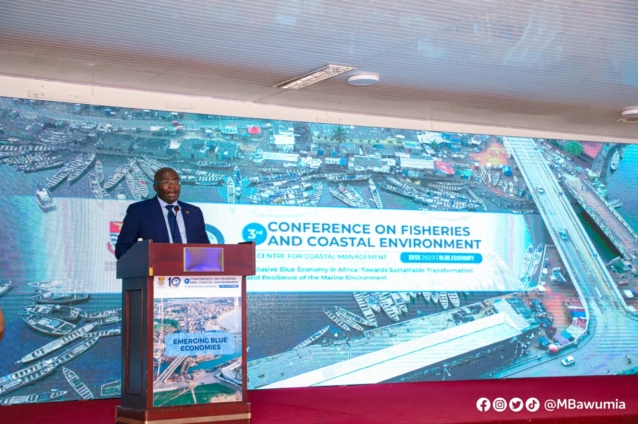Flagbearer of the governing New Patriotic Party (NPP) Dr Mahamudu Bawumia says if given the nod in 2024, his administration will shine light on environmental conservation, social equity, and economic growth.
Illegal mining, outlawed fishing activities and other activities detrimental to the environment according to the vice president, will be addressed to provide sustainable jobs for the youth.
The Vice president stressed that climate change is a critical global challenge, and it's positive to see that it is receiving attention on the global agenda, including Ghana.
Climate change has the potential to affect countries around the world, regardless of their level of development, and its impacts can be severe in terms of extreme weather events, rising sea levels, food security, and more.
Promising to prioritise climate change in his political manifesto, Dr Bawumia highlighted the significance of recognising the importance of climate action and sustainability.
"Let us leave a legacy of a thriving, sustainable and vibrant blue economy for generations to come. For all these reasons, the NPP manifesto under my leadership will have a strong inclusive bile economy component because I believe in the great potential that an inclusive sustainable blue economy can contribute significantly to the creation of jobs, food security and economic growth for Ghanaians and Africans in general."
In underscoring the importance of human capital in harnessing the opportunities in the blue economy, Dr. Bawumia said "None of our dreams of ushering a successful blue economy in Ghana and Africa as a whole would be realised without the human capital needed to grow and sustained."
The Pro Vice Chancellor of the University of Cape Coast, Professor Boahene, emphasised the significance of climate change during the workshop and advocated an immediate and strong collaboration between government and academia to address the dangers.
This highlights the recognition of climate change as a critical concern that requires a multi-faceted approach involving both academic research and government policy.
The policy interventions of digitalising the distribution of premixed fuel and denying licenses to foreign vessels are measures aimed at protecting coastal communities and their livelihoods in the context of fisheries and marine resource management.
These policies can have a significant impact on the sustainability of fisheries and the well-being of coastal populations.
Latest Stories
-
Photos: Ghana defeat Niger to finish third in WAFU-B U20 Boys Cup
45 minutes -
Star Assurance signs up for JoySports Invitational Tournament
56 minutes -
Indigenous firm Duytlex partners with Petro-Canada Lubricants to expand footprint in Africa
56 minutes -
JAPTU Ghana pays courtesy call on IGP Yohuno, POMAB members
1 hour -
The healers who were left behind: A tale from Nunyãdume
2 hours -
Telecel bridging digital divide through KNUST SONSOL Programme
2 hours -
2025 Mid-Year Budget: Trade expert calls for single-digit inflation to strengthen economy
2 hours -
From Doubt to Dreams: Telecel’s 2Moorch Money Promo changes a nurse’s life
2 hours -
A strong cedi that Ghana does feel – policy and market behaviour
2 hours -
GIPC facilitates 2,000 jobs following milestone aftercare intervention
2 hours -
2025 Mid-Year Budget: Economy is on steady course – Trade Expert
2 hours -
Stanbic Investment Management Services Ltd announces strong 2024 performance
2 hours -
Banking is necessary, but banks are not: Ghana’s digital finance disruption story
2 hours -
Ghana set to sign bilateral debt agreements today under G-20 framework
3 hours -
Gov’t narrows fiscal deficit target after better-than-expected first half
3 hours

